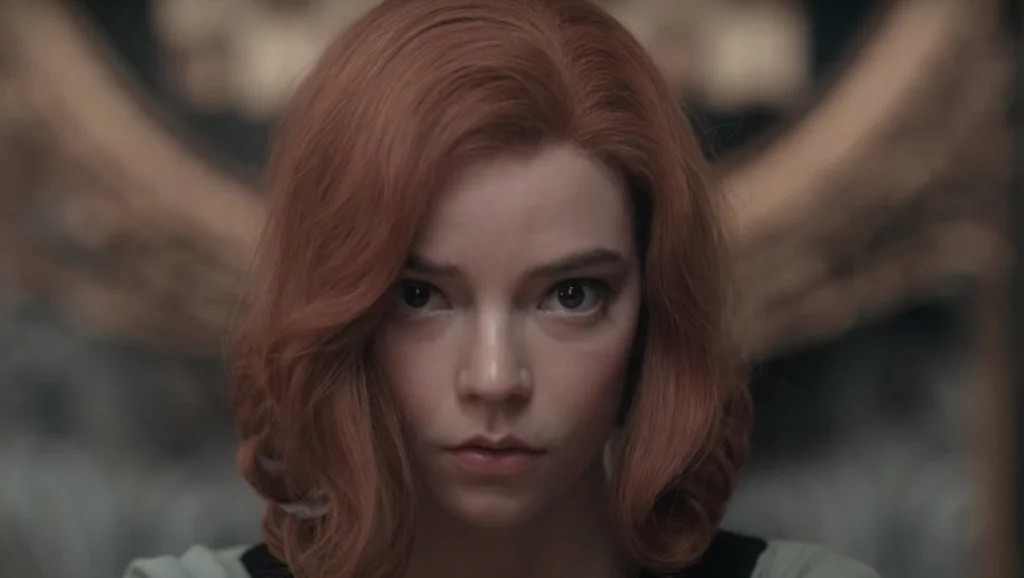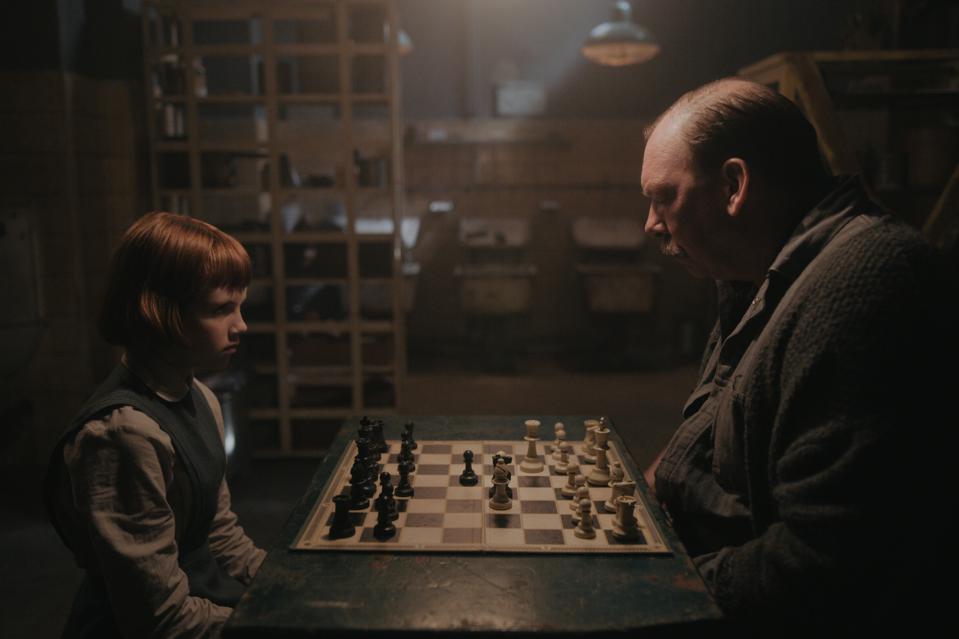Welcome to the first installment of my new series, Accidentally Autistic, in which I discuss headcanoned autistic characters — characters not formally declared autistic by the creators, but heavily coded that way, whether intentionally or unintentionally.

(Minor spoilers)
The Queen’s Gambit is a Netflix series about a fictional chess prodigy in the 1960s. The main character is Beth Harmon, an orphan who spends her nights staring at the ceiling and imagining chess pieces moving on a giant board. I was immediately struck by how autistic she seemed, and watching further episodes only strengthened that perception. When I brought it up with a group of autistic women, everyone who’d seen the show had the same reaction. Autistic vibes all around.
But what makes Beth autistic?
It’s not any one thing, but a multitude of small things. Beth is intelligent, socially awkward, and often seemingly distant. She’s reserved and you get a sense that she’s evaluating her words before speaking. When she does speak off-the-cuff, it’s obvious she’s not saying what is expected of someone her age and gender. It would be easy to chalk up her behavior to the loss of her mother, but even there, she doesn’t react in a typical way. Standing beside the car crash which had just taken her mother’s life — a crash she herself survived — Beth’s non-reaction is striking. It’s clear to any autistic watching that she’s having a shutdown, which is an internalized version of a meltdown. “Sure, anyone would be upset in that situation,” you might say. Yes, but it doesn’t stop there.

When Beth arrives at the orphanage she initially sticks to the rules, taking her pills as prescribed instead of listening to a fellow orphan and saving the green pill for later. This may be due in part to the directions themselves, which aren’t exactly clear:
Beth: What are they?
Jolene: Vitamins.
Second girl, laughing: Magic vitamins.
Jolene: If I were you, I’d save the green ones till the nighttime. Otherwise they turn off right when you need them to turn on, if you know what I mean.
Clear as mud if you’re an autistic kid, and Beth is obviously puzzled. Should she take them or not? Are the girls playing a trick on her or trying to help her? Beth is often puzzled by the actions of others. Jolene, a fellow orphan, is the one to initiate a friendship with Beth, who doesn’t show any real interest in others. Beth is happy to be alone and doesn’t really seem to fit in, especially once she starts attending a typical high school. She spends her days and nights hyperfixating on chess. It’s all she thinks about and really all she wants to talk about. As is the case for many of us, it is only through her special interest that Beth starts to make friends on her own, though the male players are initially put off by her confidence and lack of social decorum. (Side note: It is incredibly refreshing to see the interactions between Beth and the other female player. When it’s obvious that Beth has never been to a tournament, the other girl patiently answers all her bluntly-asked questions. It would have been easy to make her snide over Beth’s delivery and I’m very happy they didn’t do that.)
When Beth’s chess skills win her notoriety, the previously dismissive girls at her high school make an attempt to include Beth in their circle. Beth attends one of their gatherings. She tries her best to fit in, picking an outfit she thinks will impress the girls, a black formal dress. The other girls sit together on one big couch, in more casual, somewhat-matching outfits. Beth sits alone on a stool, posture rigid, hands clasped. They ask her about boys. Beth doesn’t understand the purpose of the question and then misses an innuendo about “trading Rooks.” When the girls turn on the television and start singing along, Beth stares at them like she just walked into a musical and flees the party.

Beth cares deeply about her adoptive mother, though she doesn’t demonstrate this emotively. Her care is shown in small gestures—cautioning her about drinking too much and joining her to watch a show. Initially I was concerned this would turn into a predatory relationship, but Mrs. Wheatley shows real affection for Beth. Once she truly understands Beth’s passion for chess, she listens to Beth infodump and watches her games to show support, even though she can’t follow all the moves. When a reporter starts asking Beth inappropriate questions, Mrs. Wheatley promptly hustles her out.
Episode five contains very striking examples of what it’s like to navigate romantic relationships as an autistic woman. An old colleague, Harry, takes an interest in Beth and offers to help her practice. He’s been following her career and has gone to great lengths to make himself more attractive, fixing his teeth, but Beth doesn’t seem to notice or send any of the usual cues of someone who’s interested. She’s not gushy or romantic. When Harry becomes discouraged decides to move on, Beth logically suggests he move in with her.
The first time Harry kisses Beth she’s momentarily stunned. He interprets this as a lack of interest. Beth quickly corrects him, clarifying that she simply wasn’t ready, but that she is now. Being mentally prepared for physical contact is totally in autistic thing, as we have a lot of sensory issues and a strong need for knowing what to expect (after a decade of marriage, my spouse has learned to verbally ask permission before initiating a hug). Post-coitus, Beth sits up and immediately starts reading. Harry tries to engage Beth in conversation, and while she does talk, her focus is on the book, leaving Harry confused and feeling dismissed. He can’t see that Beth is happy with the relationship and enjoys his company, that her reading the book means she’s comfortable enough to be herself around him. Harry’s not getting the emotional connection he wants and so he leaves.
Beth is an exceptional example of how to write autism well. It’s not the focus of her story, but you clearly see how it impacts her relationships. I doubt the writers had autism in mind when they wrote Beth, but she’s so strongly coded that autistics can identify with her.
© Val Neil All right reserved. Images belong to Netflix.

Yes I agree. I thought her step Mum probably is Autistic too. Music was her strength. Didn’t work out the social cues with her husband till he said he was staying in Denver indefinitely. She didn’t invest her time with females unless they shared her special Interest. Ie the chaperone in High School.
Blocks are more straight forward. She talks to the janitor. She relates to an adult as a young child.
As an autistic woman I love this post. I loved the show and picked up on all this and so many other little things. Like when in a later sex scene when the guy immediately starts talking chess its like something clicks and she realised what her previous lover must have thought of her book.
One small correction it was not her foster mother she adopted her so it was her mother, not birth mother. You could say adoptive mother maybe.
Thanks, I’ll fix that. I originally wrote stepmother on accident if you can believe that. 🤦
Started to watch it and recognise she maybe high function autistic person. I know this since I’m a high function autistic person.
I agree with your assessment of Beth Harmon being a person with an Autism Spectrum Disorder. I am a clinical psychologist who has treated many children, adolescents and adults who are considered High Functioning. Many of these people present differently but the common thread of having a narrow range of interests (e.g., chess), impaired social relationships (many are depicted), and no impairment with intelligence (e.g., Beth is obviously above average). I find the show very compelling.
Hi Steven, I’m just speaking for me here, but how about leaving out the “disorder” when you’re talking to autistic people? You could even leave it out when talking to your colleagues. We’re not disordered, we’re just different, and we tend to have strengths that many neurotypical people lack.
Most autistic people prefer identity-first language. I don’t “have autism“ anymore than I “have shortness”. If it seems we’re being picky over language it’s probably because we have thought much more deeply about it than neurotypicals generally do.
And the reason that many of us have “impaired” relationships with neurotypical people is because they often lack empathy, Expect us to behave like them, share their interests, fit into their world. Some of them are predatory.
I see from your profile that you are a ACT provider, which suggests you’re open to listening to autistic people. I don’t have the resources to say more here but there’s a multitude of autistic people to learn from.
Just in case clarification was needed, that is “Eleanore PhD” but as I tell my students, just Eleanore is fine.
Hi. I am autistic myself. And if you had any chance to see some of contents by autistic youtubers, not all of us don’t mind being called “disorder”, even rather embrace it, and I am one of them. (and yes I am high-functioning as well and bi-lingual which I actually make my living teaching English in my home country, fyi.) Though I have thought this could vary, even among Autistic people ourselves. Therefore I think it has to be cautious to give someone else any instruction/opinion because everything can be subjective! Thank you for you consideration.
(Just a hint: many autistic people these days object to terminology like “high functioning.” It can feel objectifying, and dismissive of the intensity of our disabilities. It is almost always inaccurate and flattening of what’s really going on, and the effort we have to expend to present that way. One of our elder community activists, Laura Tisoncik, has said “High functioning means your deficits are ignored. Low-functioning means your assets are ignored.”
Or more recently, it’s been said “High-functioning means you don’t have a right to support, and low-functioning means you don’t have a right to autonomy.”)
To me, the most striking thing that suggests Beth is autistic is when she describes the chess board as entire world in 64 squares that she can control, and is predictable.
I think not only is Beth an autistic character, but her birth mom too. I just started watching it for the second time and in Episode 1, her mom is burning things, and Beth picks up a book off the ground. It says on the cover: Monomial presentations and symmetric presentations, by Alice Harmon, Ph.D Department of Mathematics Cornell University. I believe there is hereditary autism in my family too.
“I doubt the writers had autism in mind when they wrote Beth, but she’s so strongly coded that autistics can identify with her.”
My suspicion is that opposite: that they writers *did* have autism in mind when they wrote Beth. It would be too much of a coincidence to for the writers (or actor or director) to just accidentally nail this great depiction of an autistic character.
It happens more often than you think. Most people don’t know what autism looks like, especially in women, but they definitely know an autistic or two. Usually these people are undiagnosed and simply seen as eccentric or quirky. Writers will model characters after people they know, unintentionally giving representation to something they don’t recognize. More often than not, I prefer these accidental autistics because they’re authentic, rather than caricatures, though some can be damaging (Manic Pixie Dream Girl).
Val, that’s very interesting. Do you know of any examples of accidentally autistic characters where the writer has verified that they did not intend to make the character autistic? e.g. The author has said or written something like, “I drew inspiration from some people I know, and I maybe even knew on some level that those people were autistic, but that was not conscious in my mind as I was writing the character and I did not realize that the character I was writing was going to be seen by people as autistic.”) I don’t mean to challenge your point, I would just be very interested in learning if there actually are examples (or examples as clear as Beth Harmon) that have been verified as being definitely accidental.
I am lil bit wondering and frustrated that you haven’t mentioned her sensitivity to lighting. That was the strongest sign to me from the show. She notices/gets disturbed by lighting when it alters. Even though any of the actions didn’t have to do with the main story, the creators put efforts to depict it. Therefore I am absolutely sure the writers did have autism in mind!
I didn’t mention everything, though I’ll admit I completely missed that. I’m not particularly light sensitive myself, at least not to the degree of many autistics, so it wasn’t on my radar. Probably bears a rewatch at some point.
The writer (*singular*!) was Walter Tevis back in 1983 — you might know him best for some of his other awesome novels, such as The Hustler, The Color of Money. and The Man Who Fell to Earth. (I’m picking the ones that were adopted for the screen as they’re more likely to be familiar). What I share with Tevis is the childhood experience of a rheumatic heart condition so severe as to cause a year-plus of bedridden illness, with heavy medication (a barbiturate in his case; a corticosteroid in mine, a generation later).
Such a sudden withdrawal from normal childhood socialization experiences may cause long-term behavior similar to autism, although likely with no common root cause (I never saw any scholarly writing on this, I’m just speculatively generalizing from two experiences — Tevis’s and my own — OTOH, how many children suffer from such rheumatic heart conditions, and survive…?).
Regarding this question: “The author has said or written something like, “I drew inspiration from some people I know, and I maybe even knew on some level that those people were autistic, but that was not conscious in my mind as I was writing the character ” Indeed, Graeme Simsion, author of The Rosie Project, said he based Don Tillman, on various scientists he knew, but didn’t have autism in mind when he created Don.
@Catherine Thanks, though I actually don’t think that’s a good example. The first search result I checked suggests that the author certainly was aware that he was creating an autistic character. The fact that he may have relied on observations of autistic people he knew in real life to come up with a lot of the character’s behaviors rather than rely on the “technical books” on austism that he read to figure out how to make the character behave does not in any way suggest to me that his creation of an autistic character was accidental.
“[Q:] Did you do a lot of research on Asperger’s Syndrome or Autism?
“[Graeme Simsion, author:] I did read a couple of technical books and a couple of memoirs but their influence on the character of Don Tillman was minimal.”
“Does Don actually have Asperger’s? You never say he does in the book.”
“[Graeme Simsion:] That was a very deliberate decision. As soon as you say “Asperger’s” or “Autism”, people, in my experience, focus on the syndrome rather than the character. Don is not a bunch of symptoms – he’s a quirky guy who probably would be diagnosed as being on the Autism spectrum – but I don’t claim to be an expert.”
https://www.penguinrandomhouse.co.za/penguinbooksblog/qa-graeme-simsion-author-rosie-project
Thanks. I had read a different interview where the author implied something different. Ok, continuing with your question: What about Gregory House? Could he qualify as accidentally autistic? Another way to identify someone in this category is to think of fictional characters from before the 1990s? That is, before Asperger’s syndrome was well-known and when ‘autism’ was understood as mostly intellectual debilitating.
House came up recently in an autistic Facebook thread on this very topic. He’s certainly a headcanon for a lot of people. For me personally, it’s been too long since I’ve seen the show, though from what I remember he was purposely abrasive rather than accidentally abrasive, which isn’t the case for most of us.
I think Harry is autistic as well! I don’t think he leaves after sex because he’s not getting the affection he needs. He asked if he should stay or go. She said “whatever you want,” so he did what he wanted—which was leave. They both were very matter of fact about the whole exchange and neither seemed upset.
I love this article. Thank you for writing. I love how he turned autism strengths into “Super Powers”.
You should do one of the characters from Grey’s Anatomy next. I have a strong preference for Maggie Pierce, the child prodigy doctor.
I’m autistic so I definitely understand the autism vibes but I don’t actually think she’s autistic at all. It seems more like an attachment disorder which is very very common among children in orphanages.